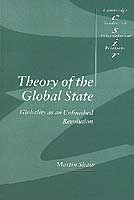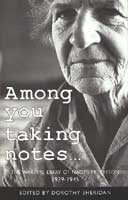Bulletin
the University of Sussex newsletter
 Next Article
Next Article
 Contents
Contents
Bookmark
New books by Sussex authors
Marie-Benedicte Dembour (Lecturer in Law, SLS)
Recalling the Belgian Congo: Conversations and introspection
Berghahn, £45.00 (hardback) |
Roger Fenn (Reader in Mathematics, SMS)
Geometry: An introductory guide
Springer, £15.95 (paper)
The publisher says: "This book is intended to introduce readers to the major geometrical topics taught at undergraduate level, in a manner that is both accessible and rigorous. The author uses world measurement as a synonym for geometry - hence the importance of numbers, coordinates and their manipulation - and has included over 300 exercises, with answers to most of them." |
Alan Garnham (Professor in Experimental Psychology, BIOLS)
Mental Models and the Interpretation and Anaphora
Psychology Press, £29.95 (hardback) |
Rebecca Harding (Senior Lecturer in Science & Technology Policy Studies, SPRU) & William E.Paterson (eds)
The Future of the German Economy: An end to the miracle?
Manchester University Press, £10.99 (paper), £35.00 (hardback)
The publisher says: "The book covers economic policy and macroeconomic performance since the election of the Schröder government, the 'Alliance of Jobs' employment policy, German corporatism (including finance and industrial relations), the future of the corporate model in a global era and German innovation. The authors argue that while there are worrying aspects in macroeconomic performance, particularly high unemployment and net capital outflows, there are real reasons to be optimistic about Germany's future. The innovation system is dynamic, industrial policy is strong and the corporate model has intrinsic adaptability which has made it both durable and competitive through the centuries of industrialisation." |
Robin Mansell (Professor, SPRU) and W. E. Steinmueller (Professorial Fellow, IDS)
Mobilizing the Information Society: Strategies for growth and opportunity
Oxford University Press, £65.00 (hardback)
The publisher says: "A principal theme of Mobilizing the Information Society is that changes are governed by public decisions that establish the institutional framework in which the private sector operates. The quality and value of the information society for the citizen is not the inevitable consequence of market and technological forces. Policy choices, however, that fail to take market and technical influences into account will prove ineffective. The authors lay the foundation for improved theories of the process of change, more appropriate strategies to achieve desired aims, and more effective policies for mitigating the effects of dislocation and exclusion from the information society."
|
Filippo Osella (Lecturer in Social Anthropology, CCS) & Caroline Osella
Social Mobility in Kerala: Modernity and identity in conflict
Pluto, £19.99 (paper) |
Martin Shaw (Professor of IR and Politics, SOC)
Theory of the Global State: Globality as unfinished revolution
CUP, £13.95 (paper), £37.50 (hardback)
The publisher says: "This ambitious study rewrites the terms of debate about globalization. Martin Shaw argues that the deepest meaning of globality is the growing sense of worldwide human commonality as a practical social force, arising from political struggle not technological change. The book focuses upon two new concepts: the unfinished global-democratic revolution and the global-Western state." |
 |
Alexandra Shepard (Lecturer in British History, CCS) & P. J. Withington (eds)
Communities in Early Modern England
Manchester University Press, £16.99 (paper)
The publisher says: "How were cultural, political and social identities formed in the early modern period? How were they maintained and what happened when they were contested? Community - 'that difficult word' according to Raymond Williams - has suffered more than most from a problem intrinsic to historical analysis; the tensions between its past and current meanings.
Divided into three parts, the book looks first at Community and Networks - how individuals were bound into communities by religious, professional and social networks. The second part looks at the importance of place - ranging from the Parish, to communities of crime, to the place of political culture. Finally the authors explore the value of rhetoric in generating community - from the King's English to the use of 'public' as a rhetorical community.
Not only do the essays make incisive contributions to particular debates; their collection in one volume allows for an original, comparative, and thematic approach that is truly interdisciplinary, exploring the many ways in which people utilised communication, space, and symbols to constitute communities in early modern England." |  |
Dorothy Sheridan (Mass-Observation Archivist), Brian Street & David Bloome
Writing Ourselves: Mass-Observation and literary practices
Hampton Press, £21.95 (paper), £53.95 (hardback)
The publisher says: "The authors of this book analyze the Mass-Observation Project as a way of understanding the nature of writing and the social conditions within which people write, the social purposes they use writing for, and how writing fits in with their life histories, all of which define writing itself. The authors are also interested in how writing is implicated in power relations, and how it is used to establish identities and to transform social situations and relationships." |  |
Richard Whatmore (Lecturer in Intellectual History, EAM)
Republicanism and the French Revolution: An intellectual history of Jean-Baptiste Say's political economy
Oxford University Press, £40.00 (hardback)
A new interpretation of political thought and political economy in France from the death of Louis XVI to the July Revolution of 1830. |
Ruth Woodfield (Lecturer in Sociology, SOC)
Women, Work and Computing
Cambridge University Press, £12.95 (paper), £35.00 (hardback) |
All titles are available from the University Bookshop. If you are a Sussex author and have a book coming out in January, let us know on ext. 8888 or by email at internalcomms@sussex.ac.uk.
 Contents
Contents
 Next Article
Next Article
Friday 15th December 2000
internalcomms@sussex.ac.uk
|